Travel packages from China to South America swell tenfold as the 2016 Rio de Janeiro Olympic Games draws near
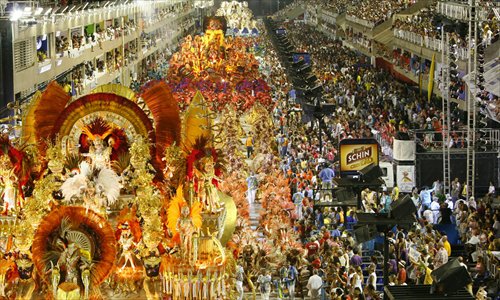
A carnival parade in Rio de Janeiro. Photo: IC
This August could be the most exciting summer holiday ever for Lin Zhiyu, a 33-year-old financial worker based in Beijing. He just ordered two tickets for a trip to Rio de Janeiro, Brazil, to watch the 2016 Rio de Janeiro Olympic Games with his wife.
"I am a crazy fan of football and badminton, and it was a great pity to miss the chance to go to Brazil to watch the World Cup in 2014," Lin said. "This time, I will not let it (the opportunity) pass me by."
His travel package includes front-row tickets to one half-final and the finals of badminton in Rio. The 2016 Rio de Janeiro Olympic Games will be held from August 5 to 21.
Aside from attending the Olympics, Lin's trip to South America will fulfill another personal goal.
"I have traveled to many countries in Asia, Europe, North America, and even Africa," he said. "South America is the only continent I have not stepped on."
Besides Brazil, Lin also plans to travel to Argentina and Chile.
On June 27, Caissa Touristic, the exclusive travel and tour partner for the Rio Olympics in China, disclosed that thousands of travel packages were purchased in China ahead of the event. The company also estimated that neighboring South American countries such as Argentina and Chile would see a tenfold increase in the number of Chinese tourists visiting the areas year-on-year as a result of the Olympics, the Xinhua News Agency reported on June 27.
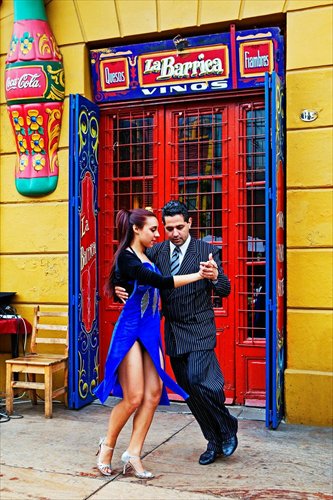
A couple dance the tango along Caminito, a street museum and traditional alley in La Boca, a neighborhood of Buenos Aires, Argentina. Photo: IC
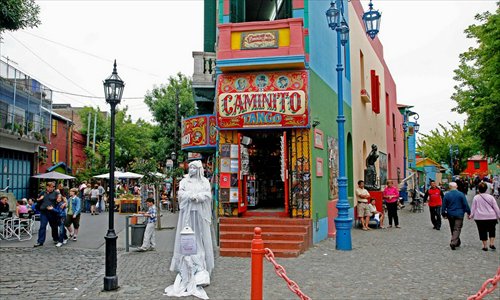
A statue in Caminito Photo: IC
A dream destination
South American countries were a dream destination for many Chinese people long before the Rio Olympics.
Many Chinese travelers to the region posted their travel stories online, and Liu Xing, 28, is one of them.
He went to Brazil in 2014, during the World Cup. What impressed him the most was the passion and enthusiasm of the South American people, which, he said, is more obvious during festivals and carnivals.
"There were parties and carnivals everywhere almost every day. Locals and foreign tourists were together, laughing, singing, dancing in the festival atmosphere," he said.
"I remember there was a young Japanese man who told me he never danced before and that he was always a prudent person, but later the same day, he got drunk and began to dance with a local guy on the street after his favorite team, Germany, won a quarterfinal."
Liu toured Rio first. During his first day in the city, he took a cable car to the top of Sugarloaf Mountain, one of Rio's iconic scenic spots, and looked across Guanabara Bay, one of the largest in all of Brazil.
He also went to Copacabana Beach, another famous spot.
"It is definitely the heaven of surfers because the water is rather clear and the wave height can reach two meters," he said.
"The beach is called 'the sexiest beach in the world' - I think it is reasonable."
The government of Brazil built a football park on the beach, where football fans from all over the world can interact and play with each other. World-class sports brands also have stalls selling sports gear in the park.
After staying in Rio for five days, Liu went to São Paulo, the largest city in Brazil. Besides the must-see scenic spots inside the city, such as St Paul's Cathedral, Ibirapuera Park, Pioneer Statue and St Paul Independence Park, he found the local life fascinating.
"If people in São Paulo are neither at work nor watching football, they must be in a nightclub enjoying samba dancing," Liu said.
"A local tour guide told me that football and samba are everything in Brazil, especially in São Paulo."
The nightclubs in São Paulo are relatively scattered, but the streets of Rua Aspequelta and Rua Augusta are two centers of nightclubs and bars, and almost every venue has one or several types of music, Liu said.
"Samba is authentic and great there, but other types of Brazilian music originating from different areas in the country are all worth experiencing," he said.
"But be careful of places with a red light on; they are mostly strip clubs, and the Rua Augusta Street is the famous red-light district."
According to Liu, the must-buy items in Brazil are the locally-produced coffee beans and Havaianas, a famous brand of slippers which sell for more than $100 in European countries but can be easily purchased in a supermarket in Brazil for tens of yuan. There are expensive specialties too, which are morpho butterfly specimens, and propolis, which is commonly viewed to be the purest in the world.
"It is said that the blue butterfly is indigenous to Brazil and is the archetype for the Butterfly Effect theory," Liu said. "But in recent years, to protect the butterfly, the sales of the specimens are decreasing, and the price is going up."
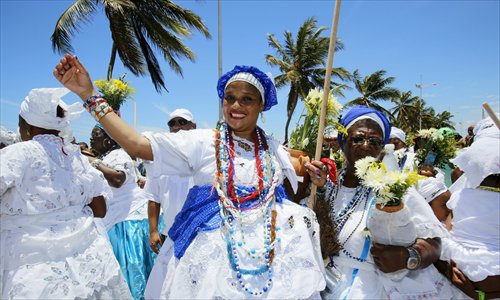
A Brazilian woman in a samba dress Photo: IC
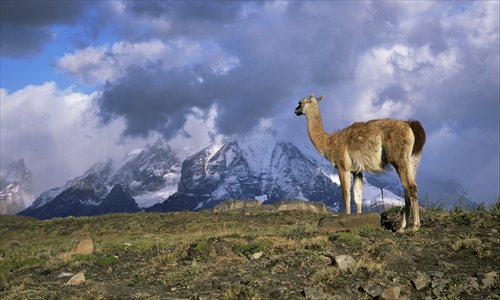
A vicuna in the Torres del Paine National Park in Chile Photo: IC
Countries further afield
Recently, South American countries have made travel to the region more convenient for Chinese tourists.
Argentina shortened the waiting time for tourist visas in July 2015. Also in July of that year, Chile made tourist visas free for Chinese tourists and allowed Chinese holders of a US or Canadian visa valid for over six months to enter Chile visa-free. Meanwhile, Ecuador implemented a visa-free policy for Chinese tourists on March 1, reported people.cn in April.
Lin said he wanted to go to Argentina not only because it is a football country but also for its tango, modern opera, and art exhibitions.
On qyer.com, a Chinese website that offers tour guide services and tourism information, a traveler named "Gypsophila5227" shared her experience traveling to Argentina for a business trip in 2015.
Buenos Aires is referred to as "South American Paris" due to its French-style architecture, tango, and Western-style cafes, she wrote.
"Just walking down a random street is fun in Buenos Aires; wandering down the street, doing some shopping in La Boca and San Telmo, two shopping centers, and sitting beside the street to enjoy the street dance performances is rather relaxing."
She also recommended Caminito Street, a street museum of tango art. She said many dancers are on the street; the side stalls sell various tango handicraft, and when one looks up, many dressed-up folk artists and dancers are sitting in front of apartment windows waving at you.
"And you should not miss Feria de Mataderos, a local market where you can immerse yourself in the local life," she wrote.
"I saw many cowboys on horses on the street, and the beef steak sandwiches and delicious nameless local handmade liquor were really good."
While many Chinese travelers are attracted to the historic figures and cultural heritage in South America, others favor the natural landscape and love ventures into the wild.
A traveler and outdoor sports fan named "Akijiejie" shared her experience of a 14-day tour in southern Chile, almost at the southernmost part of South America. She went to Torres del Paine National Park, Glacier Grey, and the Atacama Desert, and hiked in all three places.
The Torres del Paine National Park was selected by the US-based National Geographic magazine as one of the 50 must-see places in the world and enjoys the reputation of "hikers' heaven" for the variety of landscape: snow mountains, glaciers, grasslands, and lakes, where many wild animals live.
Akijiejie went to Chile in December, which is summer in South America. She and seven friends formed a hiking team and hiked in the park. The weather was changeable, and the wind and rain became increasingly intense as they climbed the mountain. It took them four hours to climb a mountain that overlooks the Las Torres, three iconic peaks.
"We met with many hares, birds, and pangolins during the hike, and even a vicuna," she wrote. "It stared at us curiously for a while and ran away."
After hiking in the mountains, she went to Glacier Grey. To get to the remote area, they rode a speed boat to the mouth of the glacier and hiked for another hour.
"It seemed that we went to another planet, just like the movie Interstellar (2014) when they landed on Miller's Planet," she wrote.
"I stood on the ice wearing crampons, facing the boundless ice and fierce wind, the weather frequently changed from sunny to snowy, and the whole world was quiet."
She wanted to get as far as possible, but the glacier was too big, and they had to return to the camp to wait for the boat back to the city.
"We didn't go very far, but we were still amazed and shocked," she wrote.
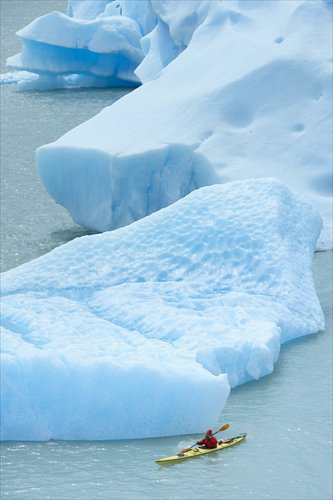
A Chilean kayaking near Glacier Grey Photo: IC
Prepping for Rio
Although Chinese tourists do not currently enjoy visa-free entry to Brazil, a new policy was created especially for Chinese tourists during the Olympic Games. Chinese and foreigners living in China can enjoy a simplified visa application process. The waiting period has been shortened 50 percent to 12-to-15 workdays, a chinanews.com report said on June 20.
Zhang Rui, the vice chairman of Caissa Touristic, suggested that Chinese tourists apply for their visas ahead of time, and change currency in China before departing, the report said.
She also warned travelers about the dangers of becoming overly enthusiastic and showing off.
"People who have booked tickets to the Olympic Games should be careful when showing off their tickets on social media," she said.
"The barcode on the ticket might get copied to make fake tickets, and the copied tickets will bring you much trouble in Brazil."
Commenting on local reports which paint Brazil as having poor public security, frequent robberies, and diseases, Liu said he had a different experience.
"I think some of the reports are totally rumors," he said.
"The major cities are very clean, and the sanitation services are good, only tourists going to the Amazon area should get inoculated against yellow fever."
He said major cities in Brazil, such as Rio and São Paulo, are safe in the daytime, but cautioned tourists against going out alone in the night with too many valuables.
"During the 2014 World Cup, the Brazilian government intensified police patrol, and in the main streets, there were at least three policemen every one hundred meters," he said.
"I think the Olympic Games will also have intensified security."
Lin said he took all the negative comments online into consideration, but nothing can kill his desire to visit South America.
"I have a hunch that this trip will be the most memorable one in my whole life," he said.
Newspaper headline: Rio de Janeiro here I come!